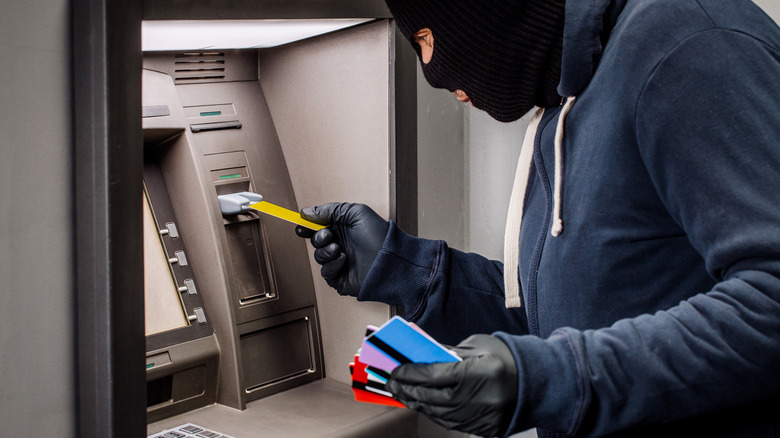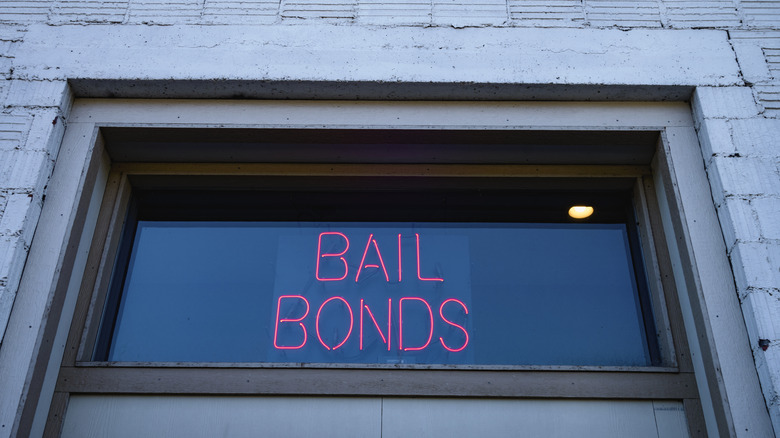You've Been Warned: Never Fall For These Sneaky Credit Card Scams
A survey conducted by Security.org highlighted the recent rise of credit card scams in the U.S. Scams and phishing affect 52 million Americans through fraudulent purchases and charges totaling $5 billion. Even though 60% of cardholders have been victims of credit card fraud and 45% have come into contact with scammer activity, four out of five of us still engage in unnecessarily risky behavior around our cards. Even though less than half the fraudulent charges reported to credit card companies were reimbursed, and only 47% of credit cards were frozen immediately to protect the cardholder, many Americans still aren't taking the appropriate precautions. Even if you know how to quickly freeze your credit, the better move is to avoid being in that situation altogether.
Although the Federal Trade Commission considers credit card fraud identity theft, not every instance of credit card fraud is considered a federal offense. It only becomes a federal case once devices, interstate or foreign activities, and specific forms of fraud involving the use of credit cards come into the picture, with penalties of up to 30 years in prison depending on the crime. However, there are estimates that say credit card fraudsters are caught only about 1% of the time since it's a crime that often happens well before the victim has any knowledge of it. With all that in mind, these are the credit card scams to watch out for currently.
Card skimming
Skimming is a popular form of fraud that utilizes a device placed inside or on the exterior of ATMs, gas pumps, and point-of-sale terminals. They lift PIN and other identifying credit card details which allows the perpetrator to manufacture fraudulent credit cards with your personal information to either steal money — using a skimmed PIN on a cash back card, for instance — or utilize the card for illegal and unauthorized purchases that leave you on the hook. This scam hits Americans in the wallet to the tune of $1 billion per year. Ironically, EMV chips already placed in most credit cards as a replacement for the old magnetic strip make them an easy target for chip reading technology employed for nefarious purposes. Sometimes, strategically placed hidden cameras can capture you inputting your PIN information, or tricky devices placed in the actual PIN pad can memorize your access codes.
Protect yourself from skimming by fighting tech with tech. Employ digital wallets or contact-free cards that won't require you to swipe or even tap your card on a reader. Where hidden cameras are concerned, a well paced hand over the PIN pad while you punch in your numbers is an easy way to conceal your information. Don't be afraid to get handsy and physically jostle the card reader or check the security seal at the gas pump if they employ them. If all else fails, here's how to spot a credit card skimmer before it's too late.
Offers to lower your interest rate
According to an Experian study, consumer debt in the U.S. totaled $17.1 trillion in 2023, with credit card debt accounting for $1.07 trillion. With so many Americans carrying credit card debt, it stands to reason that a scam taking advantage of lowering your interest rate would be so appealing to the unaware. This typically begins with a phone call from a customer service rep working for a company — usually a debt relief agency — claiming to be able to lower your credit card interest. The benefactor will catch you off guard with a limited time offer, reinforcing the need to act quickly. Of course, they won't be able to help you without your credit card information and maybe a small fee for the service. That's when they've got you.
Most reputable debt relief agencies won't cold call to solicit business nor charge upfront fees for their services. Finally, if your number is on the National Do Not Call Registry, it would be strange for a company that respects the law to call your phone to solicit business from you. The Better Business Bureau has a scam tracker you can use to check out companies that contact you, and if they aren't already on the list, you can pay it forward to the next potential victim by adding them to the list. If you want to reduce your card fees start with these tips for getting your credit card's annual fee waived.
Phishing for information
Although phishing is similar to the word related to seafood, this scam is all about reeling people in. Making use of modern technology, specifically email and text, scam artists lure potential victims into handing them personal financial information, verbally or online. Like the last scam, the perpetrator will present themselves as a reputable business offering you a product or service of interest. Whether text or email, there will usually be a link to a site — or potentially, malware — with a checkout page that prompts for your credit card information. Once you click on the link or willingly input your information into the prompt, you spring the trap. Sometimes, another form of phishing, called vishing, will have the scammer calling your phone number with an automated voice. These prompts are often accompanied with stressful messages about lost money or closed accounts meant to elicit the appropriate, usually not-well-thought-out, response.
Some ways to avoid getting taken advantage of are to check the accounts the phishing attempt is referring to or getting in touch with whatever state agency or institution the message is claiming to represent. While an agency or financial institution can ask for authentication, they won't use a PIN number to do so. If a company reaches out to you claiming to have been unable to reach you through more traditional methods, that's usually a red flag.
Sign-up farming
Along the same lines as the interest rate scam, the sign-up farming hustle is another dubious offer scam related to credit card benefits. Except in this scenario, the victim needs to have great credit in good standing with a desire to find additional benefits, and relies on the equally unscrupulous nature of its victim. The hustler will tell you the only thing they need is your social security number to apply for additional credit cards under your name. Perhaps they'll pay you some percentage of the credit in cash, or the entirety of it. They may offer you all the points — air miles, gas, etc. — but it actually won't matter. They have no intention of giving you anything but a headache once they have your information and begin using the cards under your name for any number of criminal purposes. They aren't likely to pay associated credit card bills, either.
The Social Security Administration advises consumers who fall victim to this crime that there isn't much they can do about it. Inform the Internal Revenue Service since your SSN number can be used to submit tax statements under your name and steal your returns. Also contact the Internet Crime Complaint Center (IC3). Although the Administration can give you a new number, aside from ruining your credit, think of all the ways losing your SSN number can screw up your life. Apply for your own credit cards, and keep your SSN number private.
Fradulent overcharge alerts
The overcharge scam takes advantage of the indignation victims feel after being informed by email, phone, or text that your credit card has unauthorized or incorrect charges. This scam artist may have information about what services or products you regularly buy or they could just be throwing a dart at a wall and seeing what sticks. Fortunately, fixing the overcharge problem and reimbursing you should be simple, as long as you're willing to give them the credit card account information they require. Usually, that's a login and password to your account or credit card payment processing information.
A company contacting for this sort of information should generate some suspicion. Looking up and calling the head office of the company to enquire about the charge is a good way to confirm the legitimacy of the caller. Where email is concerned, as with phishing, you don't want to click on any links in the email and definitely check the authenticity of the email address the update was sent from. A Google search should be adequate to determine whether the company uses that email address. Look out for spelling or grammatical errors, which are also dead giveaways that you're not dealing with a professional business. Worse case scenario, contact your credit card provider directly to confirm the overcharge.
Donation soliciting
On the other side of the equation, the credit card scam involving donation solicitation takes advantage of your more charitable instincts. Standard operating procedure is a phone call or email from a charitable organization asking for donations. You can probably guess the rest. You give the hustler your credit card information and the donation goes straight into the account of the fraudulent organization. It also means your credit card can be used more than once for all sorts of unauthorized transactions.
Although this oldie but goodie scam has existed pre-internet, the internet now gives you the advantage of browsing the organization online. Take advantage of the Internal Revenue Service's (IRS) Tax-Exempt Organization Search tool to verify whether the organization contacting you is a legitimate, tax-exempt entity. Get the name, address, and website information, and avoid any pressure to donate now. If the organization is legitimate, they shouldn't have any issue calling back or giving you a charitable donation link. You can also background check charitable organizations on rating websites BBB Wise Giving Alliance, CharityWatch, Charity Navigator, and Candid. You could be one of America's biggest donors or one of America's biggest suckers. Avoid the latter.
Bail requests
If you receive a phone call from a bail bondsman letting you know about a loved one in need of bail, think twice before giving up your credit card information to free them. If it's a scam, how possible will it be to get your bail money back? While the circumstances may seem unrealistic, the urgency of the call and the threat of your loved one sitting in a prison cell in Tijuana might be just enough to convince you. It's illegal for a bail bondsman to solicit for bail in the U.S. Also, a bail bondsman calling you with promises of lowering the cost of bail is another red flag. Any discussion of hidden fees or an unwillingness to produce a bail license should all be further indication that this is a scam.
You don't need to take the bail bondsman's word for it. A common sense move would be to try and contact the supposedly imprisoned loved one. If that fails, contact other family members who may know where that person is. Hang up, Google the name of the bail bond company, and follow up with a phone call. Be sure to ask for the person who contacted you by name. Also, pay attention to the phone number you were initially called with. Does it match the number of the company online? Finally, go straight to the police with the call, who should also be able to confirm if an arrest was made.
Arrest warrants and legal threats
Suppose you're at home, the phone rings, and a stranger on the phone tells you there may be a warrant issued for your arrest. It could be related to an unpaid parking ticket or back taxes that might have earned you the attention of the IRS, or some other law enforcement agency. More convincing, the phone number may even look like it's legitimate. Perhaps you don't actually speak to anyone personally but a voicemail left behind shares the details of your warrant and how to pay. The threat of legal action or imprisonment can be a powerful motivator, and if you do owe back taxes or have unpaid fines, the request for payment may seem real enough to you to justify reaching for your credit card.
However, phone numbers can be faked or "spoofed" using software called voice-over IP (VoIP). VoIP allows for scammers to use the internet to deliver phone service as opposed to a carrier which can make phone numbers appear local and can display a name similar to what you would expect. Second, law enforcement and government entities don't usually contact anyone by phone, especially about legal offenses. However, you always have the option of hanging up and calling the law enforcement or government agency to follow up on the supposed warrant.
Wi-Fi hotspots with public access
The Wi-Fi hotspot scam makes the most out of free internet in public spaces in a world where remote work and screen addictions make us all easy targets. However, many of these free hotspots in places like cafes, hotels, and restaurants, are too insecure and untrustworthy. It starts from the moment you log into a network. Hackers have been known to fudge the names of public networks just enough to be unrecognizable by users, knowing most people will just skim the networks available to them. Aardvarkcafewifi becomes Ardvarkcafewifi, which, if you aren't paying attention, is easy to miss. Once you log in to the wrong network it's open season, particularly if you decide to do some online banking. Worse, if your settings aren't set to require networks to ask for permission to join, your devices may automatically connect to a fraudulent network without your knowledge.
You can eliminate some of this risk by only joining networks you trust. When that's not possible, consider using your phone as a hotspot if you're carrying around a laptop or tablet. Set up your devices so networks need to ask permission before you join so you have some control over what networks you connect to. If at all possible, avoid doing anything that requires password credentials or credit card numbers — banking or online shopping, for instance — since you can't always be sure who else is paying attention.
Social Security penalties
This scam targets the elderly and hurts them financially in the worst ways. While the main mission of the social security scammer is to steal someone's identity in order to gain access to credit cards or financial vehicles under their name, it can also borrow tactics from the arrest scam. A phone call from a fake representative of a government agency calls with a threat to turn off the taps on grandpa's social security payments if they don't pay some illegitimate fee or penalty. This can come through any number or means, including snail mail, email, text, or phone. In 2020, The Office of The Inspector General of the Social Security Administration reported total losses of $48 million from victims who lost, on average, $5,800 alongside 718,000 reported incidents of phone-related fraud.
Tell your grandparents and any retirement age individual you know that the Social Security Administration doesn't operate in this way. They won't ask for your credit card or Social security number, and if they do, it's likely a scam. Even if they do require a payment for something, they will never push for immediate payment nor will they do so without allowing the opportunity to appeal that request. Nobody within the administration will ask for personal or financial information by email, and you should compare the email address with the Social Security administration .gov address for legitimacy. Report these attempts to the Social Security Administration by contact methods found on its real website.
Identity fraud
You may have noticed the main goal of many of these scams involves some form of identity theft, which should give you an idea of how prevalent and disruptive it can be to your life. Credit cards, social security, medical insurance and even bank accounts can all be applied for, opened, or pilfered through the theft of your identity. All means of communication can be vehicles for this crime, and rely to a large extent on you feeling pressured to react immediately without doing your due diligence. Keep your credit card, bank account information, and social insurance numbers to yourself, since most legitimate enquiries don't involve being asked for these things. Even if you legitimately owe a debt, there are things a debt collector is legally allowed to do. They can all be checked out on the Nationwide Multistate Licensing System, a record of licensed debt collection agencies approved by the government.
Dead giveaways include billing for things you didn't purchase, debt collection for debts you don't owe, missing mail, or assuming you regularly request your credit reports, credit cards, loans, or other lines of credit you've never asked for. Report these issues online to the Federal Trade Commission's Identitytheft.gov website or by phone at 1-877-438-4338.











